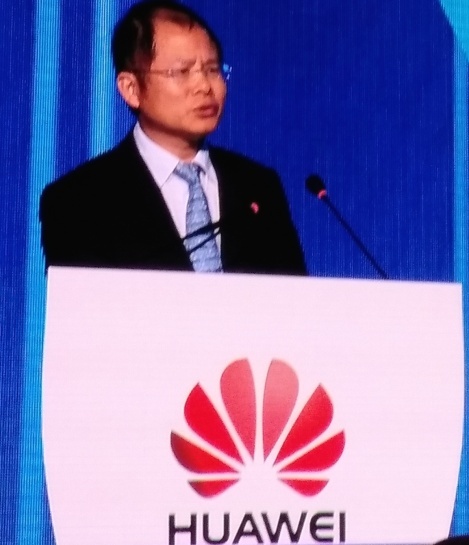
Huawei is already the biggest dog in the vendor pack. Now it's predicting it can defy economic gravity and double sales in the next five years.
In 2015 Huawei sold $40 billion in solutions and services in its B2B business lines. Current acting CEO Eric Xu (above) says the company believes it can double that to $80 billion by the end of the decade, equivalent to topline annual growth over the next five years of around 13%.
Around 15% of that will be from enterprise sales. That leaves around $68 billion from the carrier business, which last year ran up $35 billion in revenue, accounting for around a third of sales by the top five traditional telecom vendors.
What makes Huawei's guidance notable is it comes at a time when its customers are scrambling to find new sources of growth in the face of rising costs and competition. Operators are demanding more and more from their suppliers at a lower expense.
Huawei hasn't given guidance for its handset division, which last year shipped just under $20 billion worth of devices, but if it merely maintains that level of sales, it is on track to become a $100 billion company by the end of the decade.
Five-year forecasts can go wildly wrong, especially in industries under the influence of Moore's Law, and doubly so for the precarious device business. Yet on Huawei's past performance, you'd be wary of betting against it.
Fast transformation
As recently as five years ago, 83% of Huawei's business was with telcos; that's now down to 58%.
It considered selling off its handset division - at that time a white label supplier to operators - but changed its mind because the operators were complaining about the lack of choice in market dominated by Apple, Samsung and Google. Huawei read the market perfectly and has since combined design and branding expertise with its manufacturing capability to become a top three global brand.
At the same time it established its enterprise division, which last year sold $4.4 billion in gear, primarily to Chinese business. Huawei tips this will reach $10 billion in 2019, representing CAGR of above 20%. China has a small enterprise IT market relative to its economy. At the company's annual analyst summit last week, Xu praised rivals Cisco and Dell for their aggressive investment plans in China.
Huawei is expecting its telecom sales to grow to around $68 billion in 2020, up 94% from last year. If it meets that target, that would truly make it the master of the telecom business. In 2015 the other four suppliers tallied $70 billion between them.
In its core service provider division Huawei is betting it can sell more gear, that it will take more of the load in managing networks (services last year accounted for a third of carrier revenue) and that it can take more market share not only from its traditional rivals from the comms sector but also IT players as well.
Huawei's competitors once considered it a low-cost imitator. Most of those rivals are no longer around, while Huawei has crossed every hurdle it has encountered without breaking stride.
It is already China's first truly global corporation, with operations in 170 countries. Out of China's tooth and claw capitalism Huawei has created an aggressive and demanding business culture . Unlike most Chinese companies, however, it has always invested generously in R&D and has a self-confident, global outlook.
The security phobia surrounding Huawei has obscured to many outside China the resilience and inventiveness of the company. That its growth has come without any contribution from the world's biggest economy reminds us that it's not one for quitting.